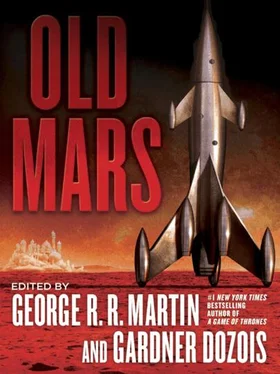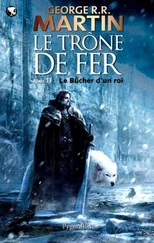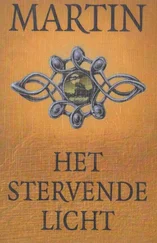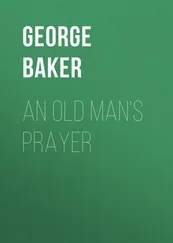Here he tells the suspenseful story of a young girl who sets off on a rescue mission with many lives at stake, realizing quite well that it’s dangerous—but perhaps not realizing quite how dangerous it’s going to become.
King of the Cheap Romance
JOE R. LANSDALE
(In memory of Ardath Mayhar)
I GLANCED AT THE BODY AND TREMBLED. I LOOKED AT THE blue ice directly in front of me, and beyond that at the vast polar regions of Mars, stretched out flat, and way beyond that was a mountain rise. Past that rise was where I needed to go. I felt cold and miserable and sad, and for one long moment I wanted to quit. Then I told myself, that’s not what Dad would have wanted. That’s not what he would have wanted his daughter to do.
We Kings, we weren’t quitters. It had been drummed into my head since birth. I looked down at Dad’s corpse, all that was left of my family, wrapped in silver bedding, lying on the sled, and it was as if I could hear him now. “Angela, put your ears back and your nose forward, and keep going. That’s how we do. Just like an old mule. That’s how we Kings are. We keep on going when everyone else has already quit.”
That made me feel strong for a moment or two, then I was thinking back on how I had ended up where I was, and that took the zip out of me again. I couldn’t get hold of being here on the ice, after only moments before being high in the air. It felt as if it was all some kind of dream, some astral visitation of someone else’s life who looked like me and had a dead dad. But the real me was somewhere else, and at any moment I’d snap awake and find myself back in the silver airship, cruising high above the Martian ice.
I didn’t, though.
It was really me. Angela King. Out on the ice, breathing out air puffy and white as clouds, the body of my father lying on a sled at my feet.
I took a deep breath of chilly air and determined then that I had to get over my feelings of defeat. I was a King. I couldn’t quit. Something might quit me, but I wouldn’t quit. Not until I was as dead as Dad.
What happened was this.
The fever hit the Far Side, as we called the city long beyond the mountains. The Martian fever is a nasty beast. It comes on sudden and hot and burns the mind right out of a person, turns them red, mounds up pus-filled lesions quick-time, makes a person quiver, scream and rave, go completely off their nut. No one really knew how it gets started, but it happened now and then, comes out of nowhere like rain from a clear, sunny sky. It was thought to have something to do with certain kinds of Martian water, melted snow that flowed down out of the mountains and joined up in streams and creeks that got into the water supply. Mars was mostly hot, dry desert, but up around the ice caps it was rich in water, cold and savage.
Though the fever was brutal, there was a cure, and it was mighty effective, if not readily available. That’s what my father and I were trying to do, make it available. It was considered a routine trip, though any trip on Mars can blow out and go bad in quick-time. Just when you thought things were good and the land was tamed, Mars would throw a trick at you.
The ship we had was quick and light. It held us and a couple of sleds, which we didn’t think we’d need, an emergency stash of supplies, and a small, padded leather bag of vaccine. That’s all it took, a small bag containing a few vials. A bit of it went a long way. In fact, Dad said a drop would fix the fever and keep you from having it again, which meant it didn’t take much at all to cure an entire Martian city, and on Mars a city was about two to three thousand. Dad said on Earth you’d call that kind of gathering a town, maybe even a community. But on Mars it was a city. I didn’t remember Earth too well, and had yet to go back, the return trip being so expensive and me not really wanting to go. I liked it on the Red Planet, out in the area where it wasn’t red at all, but blue and white with freezing ice.
Anyway, Dad said a drop of vaccine would do, and he ought to know. He was a doctor before he died out there on the ice.
Dad had not wanted me to come. He always said, “On Mars, things can and do go wrong, regular as clockwork, and irregularly too.”
But since my mom was dead and I would have had to stay with people I didn’t know well, I whined my way into the glider, and up we went, powered by sunlight, carried by whining turbines, darting fast through the thin-aired Martian sky. When we started out, both moons were up and shiny as silver. Dad said he could never quite get used to two moons. I didn’t remember much about Earth, but I did remember it had one moon in the sky. That seemed pretty deficient after living on Mars with one moon fast and one moon slow, both bright in the sky and looking not so far, as if you could stand on a ladder and touch them.
We sailed along under the moonlight. The night air sucked into the turbines and fed them and charged them along with solar and whatever those pellets were that Dad put in the sliding tray that slid in and out of the instrument panel.
I sat in the copilot chair, having learned a thing or two about navigation, and we cruised through the last of the dying night; and then the light rose up and the world below went from shiny black to blue-and-white ice. What I think about is how if we’d have left a few seconds earlier, or a few seconds later, none of it might have happened. But there we were with first light on the windshield, then the shield turned dark, and there was a whomp, a sound like some kind of machine tearing metal. It wasn’t metal though, It wasn’t the ship. It was the scream of the Martian Bat. The damn things are huge, and, unlike Earth bats, which Dad says travel by night, Martian Bats travel day and night but are blind, their eyes huge and white as snow. They are guided by some kind of in-built radar. That radar helps them find prey, and I guess the bat thought we were one of the great blue birds that fly over the ice, for it came at us and let out with its horrid scream that sounded like metal ripping. The craft twisted and swirled, but held to the sky all right, at least until the Bat bit us and clawed us and we started to come apart.
The craft killed the bat due to the collision of its wings or part of the beast’s being sucked into a turbine. Whatever did it, we both went down. I remember seeing out the windshield a glimpse of bat’s wings, a near subliminal glimpse of those white eyes and that toothy mouth. The front end of the ship bent up, and down we went. Had the bat not had hold of us, had what was left of its massive wings not held and glided, we would have dropped faster than a stone and with the sudden impact of ripe fruit being slammed on rocks.
Still, when we hit, I was knocked unconscious.
Coming to, I discovered I was lying on the ice. I had on my insulated suit. Dad had insisted I wear it, even in the craft, and I was glad then I had. I didn’t have the hood pulled up, though, and when I sat up on the ice, stiff and sore, I pulled it over my head and lifted up the goggles and the chin cover that had been lying on my chest, suspended there by a dangling strap.
I tried to get up, but it was like I was wrestling someone invisible. I just couldn’t do it, at least not at first. It was as if whatever kept me balanced had been knocked off its gyro. I finally got my feet under me, which took me so long I thought maybe a Martian year had passed. When I did get to my feet, I looked around for Dad but couldn’t find him. Over the hill, I saw the Martian buzzards gathering, their red-tipped wings catching the rays of the sun. I stumbled over a little mound of snow, and there was the ship. Or what was left of it. It was so wadded up with the bat, which was about the same size, that it looked as if a great leathery black animal had mated with a silver bird and fallen to earth in blind passion.
Читать дальше












